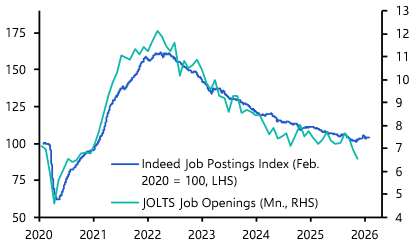Neil Shearing
Group Chief Economist
While the joint statement issued last night by the Swiss National Bank (SNB) and FINMA (the Swiss regulator) offering to provide Credit Suisse with liquidity “if necessary” appeared a little half-hearted, the statement by Credit Suisse this morning that it will “exercise an option to borrow up to CHF 50bn from the SNB is more significant. It’s early days but equity markets (and in particular bank stocks) are rising and bond yields are rebounding.
We’ll be updating clients throughout the day, including at an online briefing at 3pm GMT/4pm CET/11am ET. In the meantime, three things are worth watching.
The first – and most obvious – is whether the positive reaction in markets continues. Key things to monitor are whether the rebound in European bank stocks continues, and whether bid/ask spreads in bond markets (a key gauge of market risk) narrow.
The second is whether concerns shift from Credit Suisse to other parts of the financial sector. The problems at Credit Suisse are very different to those that brought down SVB a few days ago. But they serve as a reminder that as interest rates rise, vulnerabilities are lurking in the financial system. Key areas to monitor are smaller European banks and shadow banks, particularly open-ended funds that might suffer from maturity mismatches. (See here.)
Finally, the ECB meeting at 1.15pm GMT/2.15pm CET will be the first scheduled meeting of a major central bank since the SVB crisis escalated last week and will provide a sense of how great policymakers perceive the risks to be. (The Fed and the Bank of England are in a period of purdah ahead of policy meetings next week.)
There will no doubt be a tussle between more hawkish members of the Governing Council (including Joachim Nagel of the Bundesbank) who will argue the bank should press ahead with a 50bp increase in interest rates to 3.0%, and more dovish members (including Chief Economist Philip Lane) who will argue that in light of recent developments they should pause. The outcome will ultimately be decided by a ”swing” group of policymakers including Isabel Schnabel – if they judge that the financial risks are contained, it’s still possible that policy rates are raised.
The press conference will be critical, particularly given Christine Lagarde’s track record of loose talk that upsets markets. She needs to reassure investors that no major euro-zone European banks are in the same position as Credit Suisse and – more importantly – stress that euro-zone institutions have the unequivocal backing of the ECB (no mention of conditionality or moral hazard, please…).
Other central banks – including the Fed, Bank of England, and the SNB itself – are due to meet next week. It’s still too early to call the exact implications of recent events for monetary policy but all things equal it is likely to mean that interest rates are lower than the markets previously thought (though not necessarily lower than our forecasts). More immediately, if the early morning rally reverses, or the markets take fright post-ECB, it’s possible that we may get a joint statement from the world’s major central banks later in the day stressing their commitment to being a lender of last resort and maintaining global liquidity through FX swap lines.




